While other areas of retail rebounded in 2021, hospital gift shops faced ongoing challenges due to the COVID-19 pandemic.
At many hospitals, visitors have been restricted, which has led to declining gift shop business from patients, friends and family members. After a decade in which hospital stores became community retail hubs, this sharp contraction has led many gift shops to return to basics — and to focus on employee business, rather than traditional patient gifts. 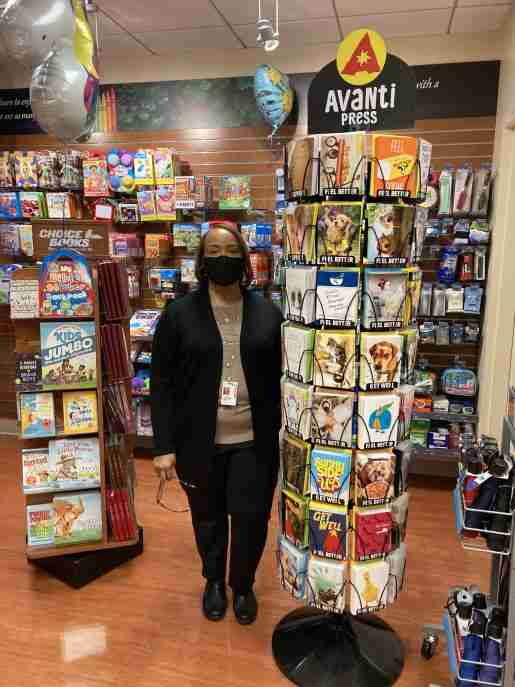 Charlotte Stephan, store manager, Moffitt Cancer Center Gift Shop, Tampa, Fla. The store is one of the shops at the 13 hospitals with retail outlets managed by Texas-based Cloverkey. Charlotte Stephan, store manager, Moffitt Cancer Center Gift Shop, Tampa, Fla. The store is one of the shops at the 13 hospitals with retail outlets managed by Texas-based Cloverkey.“Everything this year due to COVID is more practical,” observed Roz Tuerk, manager and buyer at the Grand View Hospital gift shop in Sellersville, Pa. “Right now, there aren’t really any outside customers. We have a protocol where it’s one visitor per patient per hour, so not many people are browsing.” In contrast, hospital employees are often working longer shifts than before the pandemic, making on-site shopping even more convenient.
Before the pandemic, the 1,200-square-foot store sold a variety of fashion and accessories, from handbags to jewelry and scarves. Now the best-selling apparel is scrubs with the Grand View logo. Tuerk estimated last year’s revenue to be approximately one-third of the pre-COVID annual sales of $275,000.
Even once the crisis subsides, Tuerk isn’t sure the store will return to its former merchandise mix — a blend of impulse fashion and novelty gifts that appealed to the older clientele. “With all the turnover, we’re starting to hire much younger people, millennials,” Tuerk reflected. “And this younger generation isn’t into tchotchkes. I’m thinking I’ll need to do more tie-ins with wellness.” 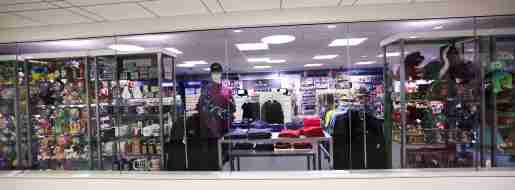 An expansive selection of merchandise, including Boston Children’s Hospital logo goods, at Boston Children’s Hospital in Boston, Mass. Managed by Cloverkey since mid-2021, revenue has held steady at the 1,000-square-foot gift store, and logo apparel is best-selling. An expansive selection of merchandise, including Boston Children’s Hospital logo goods, at Boston Children’s Hospital in Boston, Mass. Managed by Cloverkey since mid-2021, revenue has held steady at the 1,000-square-foot gift store, and logo apparel is best-selling.At Paoli Hospital in Paoli, Pa, “the bottom line is that there just aren’t many people here visiting,” observed Gwynne Gillette, chief operating officer of Cloverkey, a Texas startup that manages the gift shops at Paoli and 12 other United States hospitals. Revenue is down an estimated 50 percent from projections at Paoli’s 1,800-square-foot gift shop, which was closed for more than a year and reopened last June under Cloverkey management.
Nonetheless, Paoli “does great with gloves and hats, and also designer compression socks,” Gillette noted. Apparel “is in our top five categories” across all 13 hospitals Cloverkey manages, with fashion overall in top place. Accessories like earrings, decorative badge wheels, scarves, robes and slippers sell well to the Paoli Hospital employees who now constitute most shoppers. Non-employee customers are likely to be those whose chronic conditions require multiple visits to departments like oncology, which is adjacent to the gift shop.
But at the busy labor and delivery unit, expectant fathers are typically the only visitors allowed, depriving the gift shop of typical sales opportunities. “Without family visitors, nobody’s buying the ‘Proud Grandpa’ hats, or toys and gifts to placate the kids tagging along,” Gillette reflected. “Those whole categories are gone. Gifts in general are down.” 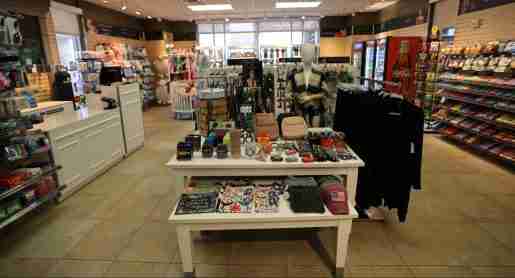 A gift store at The Hospitals of Providence, East Campus, in El Paso, Texas. Fashion merchandise is at the top of best-sellers at the stores managed by Texas company Cloverkey. A gift store at The Hospitals of Providence, East Campus, in El Paso, Texas. Fashion merchandise is at the top of best-sellers at the stores managed by Texas company Cloverkey.It is a very different picture at Boston Children’s Hospital, whose gift shop has also managed by Cloverkey since mid-2021. Since pediatric patients are permitted more visitors than adults, revenue has held steady at the 1,000-square-foot gift shop; Gillette expects 2021 sales to reach $750,000, roughly what the prior operator reported for 2019.
For both hospital employees and visitors, apparel bearing the Boston Children’s logo is a best-seller. “A lot of hospitals are really working hard to strengthen their brand image and pride in being part of larger systems, and logo apparel is a way to do that,” Gillette noted. Hoodie sweatshirts and tie dye styles appeal to children, while fleece and lightweight performance jackets are favorites of staff, who are subject to dress codes.
In Lubbock, Texas, lenient visitation policies have kept sales strong at the three Lori’s Gifts concessions Carol Burrows manages at Covenant Health, Covenant Children’s Hospital, and the UMC Health System. “We’ve been very fortunate; sales are good,” Burrows reported. At the hospitals where her shops are located, patients are allowed two visitors — as opposed to only one at many East Coast facilities. “We do have a captive audience,” Burrows pointed out. “People are tired, they don’t want to have to go somewhere else to shop. This is a safe place.” 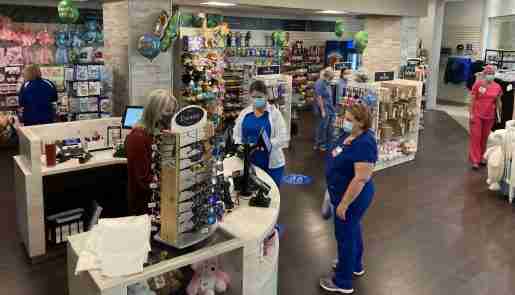 An overview of the store at Texas Health Huguley Hospital gift shop with Store Manager Jamie Salinas behind the counter. An overview of the store at Texas Health Huguley Hospital gift shop with Store Manager Jamie Salinas behind the counter.For both employees and hospital visitors, fashion is a popular category in Lubbock. Sweaters, tunics and leggings are all popular at UMC Health: Burrows said Texas shoppers prefer casual over dressy attire, especially during the pandemic. To accessorize, handbags and jewelry have been top sellers, and sales of these items jumped during holiday promotions at Covenant hospitals.
With few nearby retailers, Burrows said Lori’s hospital shops have a loyal repeat clientele. “Our hospital employees will come in to see what’s new,” she said.
At the Lubbock Lori’s locations, which range from 1,000 to 1,400 square feet, Burrows keeps sales strong by cultivating personal relationships. “Selling is knowing your clientele,” Burrows advised. “Giving them a call when you get something you think they’d like. Or when they pop in, show them what’s new.” 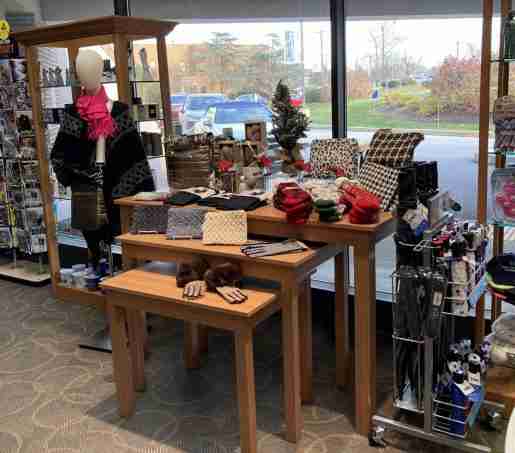 A display of apparel and accessories at Paoli Hospital in Paoli, Pa. Because of pandemic visitor limits, more shoppers are employees, and gloves, hats and designer compression socks sell well. A display of apparel and accessories at Paoli Hospital in Paoli, Pa. Because of pandemic visitor limits, more shoppers are employees, and gloves, hats and designer compression socks sell well.In the Northeast, pandemic demands are suppressing hospital sales for yet another winter. Revenue is down by more than three-quarters at Community Medical Center’s gift shop in Tom’s River, N.J., where pre-pandemic sales had topped $500,000 annually.
But Irene Burns, who has managed the gift shop for 30 years, is hoping for a recovery later in 2021. “We had a huge outside following,” recalled Burns at the 825-square-foot store. With 20 sales representatives and an average of 25 volunteers, “our sales were incredible. We could try a little of this, a little of that. People would whisper, ‘I got it at the hospital gift shop!’”
Under heavy COVID restrictions, the new administration put a freeze on new inventory. But last fall, Burns got the green light for new orders, shifting back to basics and working with just two volunteers. Her mostly in-house clientele is currently hospital workers shopping for children, birthdays and other occasions. 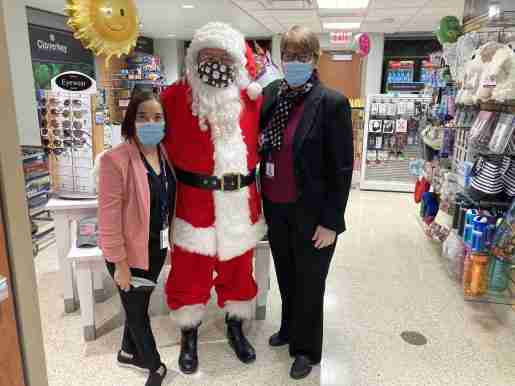 Gift Shop Manager Veronica Franco, a person dressed as Santa Claus, and Cloverkey COO Gwynne Gillette, photographed at a gift store at the Hospitals of Providence, Memorial Campus, El Paso Texas. The store is managed by Cloverkey. Gift Shop Manager Veronica Franco, a person dressed as Santa Claus, and Cloverkey COO Gwynne Gillette, photographed at a gift store at the Hospitals of Providence, Memorial Campus, El Paso Texas. The store is managed by Cloverkey.This winter, Burns’ best-selling apparel category is warm layers — wraps, shawls, ponchos and throws. “People get cold upstairs,” the manager noted. “Patients will come down asking, ‘Do you have something my wife can wear, she’s freezing.’”
Huge sales of scarves, dresses and fashion tops are, for now, a thing of the past. Still, the Demdaco line of apparel, gifts, décor and novelty housewares continues to sell well, and tote bags are a perennial favorite. “They’ve got a wide variety of merchandise — baby, plush, everyday fashion,” Burns said. “People wonder why there isn’t more new stuff, but I’ve narrowed it down to what works for now.” |
 Charlotte Stephan, store manager, Moffitt Cancer Center Gift Shop, Tampa, Fla. The store is one of the shops at the 13 hospitals with retail outlets managed by Texas-based Cloverkey.
Charlotte Stephan, store manager, Moffitt Cancer Center Gift Shop, Tampa, Fla. The store is one of the shops at the 13 hospitals with retail outlets managed by Texas-based Cloverkey. An expansive selection of merchandise, including Boston Children’s Hospital logo goods, at Boston Children’s Hospital in Boston, Mass. Managed by Cloverkey since mid-2021, revenue has held steady at the 1,000-square-foot gift store, and logo apparel is best-selling.
An expansive selection of merchandise, including Boston Children’s Hospital logo goods, at Boston Children’s Hospital in Boston, Mass. Managed by Cloverkey since mid-2021, revenue has held steady at the 1,000-square-foot gift store, and logo apparel is best-selling. A gift store at The Hospitals of Providence, East Campus, in El Paso, Texas. Fashion merchandise is at the top of best-sellers at the stores managed by Texas company Cloverkey.
A gift store at The Hospitals of Providence, East Campus, in El Paso, Texas. Fashion merchandise is at the top of best-sellers at the stores managed by Texas company Cloverkey. An overview of the store at Texas Health Huguley Hospital gift shop with Store Manager Jamie Salinas behind the counter.
An overview of the store at Texas Health Huguley Hospital gift shop with Store Manager Jamie Salinas behind the counter. A display of apparel and accessories at Paoli Hospital in Paoli, Pa. Because of pandemic visitor limits, more shoppers are employees, and gloves, hats and designer compression socks sell well.
A display of apparel and accessories at Paoli Hospital in Paoli, Pa. Because of pandemic visitor limits, more shoppers are employees, and gloves, hats and designer compression socks sell well. Gift Shop Manager Veronica Franco, a person dressed as Santa Claus, and Cloverkey COO Gwynne Gillette, photographed at a gift store at the Hospitals of Providence, Memorial Campus, El Paso Texas. The store is managed by Cloverkey.
Gift Shop Manager Veronica Franco, a person dressed as Santa Claus, and Cloverkey COO Gwynne Gillette, photographed at a gift store at the Hospitals of Providence, Memorial Campus, El Paso Texas. The store is managed by Cloverkey.